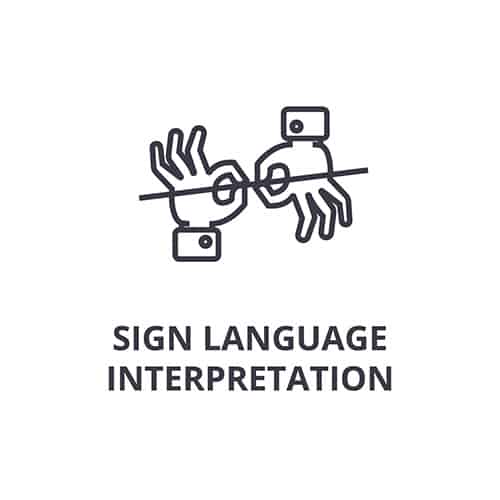
Hearing Impairment imparts psychological issues in the deaf because they are looked down upon as a marginalized part of society. Along with this, the deaf person faces societal judgments and feels left out and incomplete among the group of hearing people. These conditions cause toughness in the deaf personality. Therefore, when they work with the interpreter for a cause there are several challenges to face for the sign language interpreter. We have listed down five problems faced by the deaf interpreter. Many other side problems are going on but the major ones are below.
1.Physical Fatigue:
Sign language is the visual language. Body movements, expression, face, and hand movements all are included and work simultaneously during sign language interpretation. In this discourse, the physical health of an interpreter is affected due to the continuous working hours to interpret. Interpreters develop physical disorders in the later stages of their interpreting careers.

The pain they bear during their working hours is unimaginable. Continuous movements and alertness also affect accuracy. As humans have a limited concentration spans that counts for twenty-five (25) minutes according to research. During conferences and courts sessions interpreters work for hours that affect the interpretation efficiency.
2. Interpreting in Pairs:
According to the Registry of Interpreters for the Deaf (RID) almost every interpreter is at the risk of developing injury at some stage in their career that could be a lifetime disability. Hence to overcome the physical challenges for interpreters working in pairs is considered to be the solution. Two interpreters rotate to offer a simultaneous interpretation. The team alternates their duties to relieve the stress of one another but the off-duty interpreter is still on-duty as it is busy helping and checking the accuracy of other interpreters and make suitable changes in time. Hence, if the physical engagement is not involved, mental engagement is still utilizing.
3. Discrimination:
There is discrimination made to the official sign interpreter by the deaf community. It is considered that hearing people with sign language skills are culturally insensitive and unable to comprehend the emotional aspect of a conversation with the deaf. The deaf community considers the Children of Deaf Adults (CDA’s) trustworthy of interpreting them as they have grown up with deaf. Therefore, professional sign language interpreter is always discriminated.
4. Lack of Prep Materials:
By following the discrimination, interpreters for the deaf get minimum exposure to the deaf client that results in the lack of subject matter of conversation. This develops a hindrance for the deaf interpreter to provide their error-free work because of a lack of preparation notes and guidelines about the conversation. Deaf interpreter is not familiar with the personality of the deaf that leads to misinterpretation often.
5. Drive for social justice:
Interpreters term their profession under the category of social justice for the deaf. As they have invisible disabilities and it’s hard to identify hearing impaired. From the 1600s deaf were considered dumb and mentally retard. Many sociologists also claim this such as Aristotle. The deaf were marginalized and treated ill in society. But with time and development organizations for the disabled change the pattern of injustice. Hence interpreters are the medium and voice for non-hearing people. But it’s a challenging task for them to portray the deaf as capable and complete human beings in the community of hearing people.
Conclusion:
Problems faced by the deaf interpreter are listed above that count on physical fatigue, working in pairs, discrimination by the deaf community, lack of preparation material, and hectic drive for social justice. After a lot of improvements interpreters still face these problems in their interpreting careers. Languagers is playing an effective role to address interpretation-related problems. Stay tuned for more unique content.


No comments:
Post a Comment